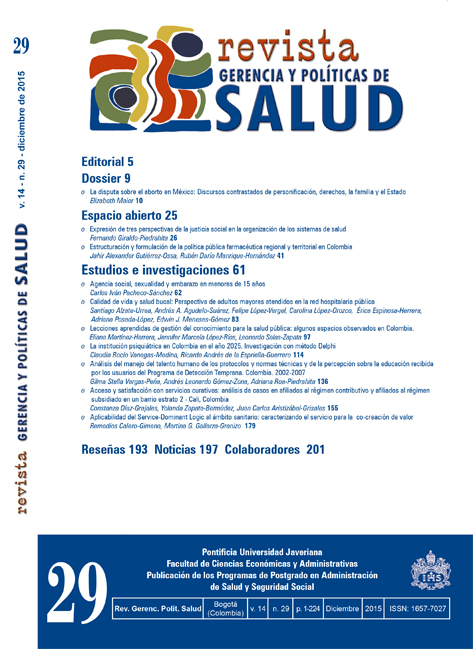Abstract
Objective: to analyze management protocols and standards, and the perception of users about the education received in three early detection programs in Colombia. 2002-07. Methodology: a retrospective descriptive study of transversal cut was made, according to records from the National Demographic and Health Survey 2007 (ENDS). Findings: 57 % of the workforce was in public institutions, the female predominance (67 %), the 21-30 years (44 %), and labor flexibility (56 %). Compliance Protocols, holding (85 %) knowledge (96 %), using (98 %) and
availability (74 %) and technical standards, holding (93 %) and availability (68 %). 79.2 % of maternal education perceived to check again, and other programs, 90 %. Conclusion: was not met in 100 % established protocols and standards, in what may have influenced labor flexibility and the discouragement of public health programs, in response to the neoliberal system and to the detriment of quality.
Copyright notice
The Journal Management and Health Policies is registered under the Creative Commons Recognition 4.0 International license. Therefore, this work can be reproduced, distributed and publicly communicated in digital format, provided that the name of the authors and the Pontificia Universidad Javeriana are recognized. It is allowed to quote, adapt, transform, autoarchive, republish and create from the material, for any purpose (including commercial), provided that authorship is properly acknowledged, a link to the original work is provided and if changes have been mad. The Pontificia Universidad Javeriana does not retain the rights over published works and the contents are the exclusive responsibility of the authors, who preserve their moral, intellectual, privacy and publicity rights.
The endorsement of the intervention of the work (revision, style correction, translation, layout) and its subsequent disclosure is granted through a license to use and not through a transfer of rights, which means that the journal and the Pontificia Universidad Javeriana disclaims any liability that may arise from ethical misconduct on the part of the authors. As a result of the protection provided by the license for use, the journal is not obliged to publish retractions or modify the information already published, unless the erratum arises from the process of editorial management. The publication of contents in this magazine does not represent royalties for taxpayers.


